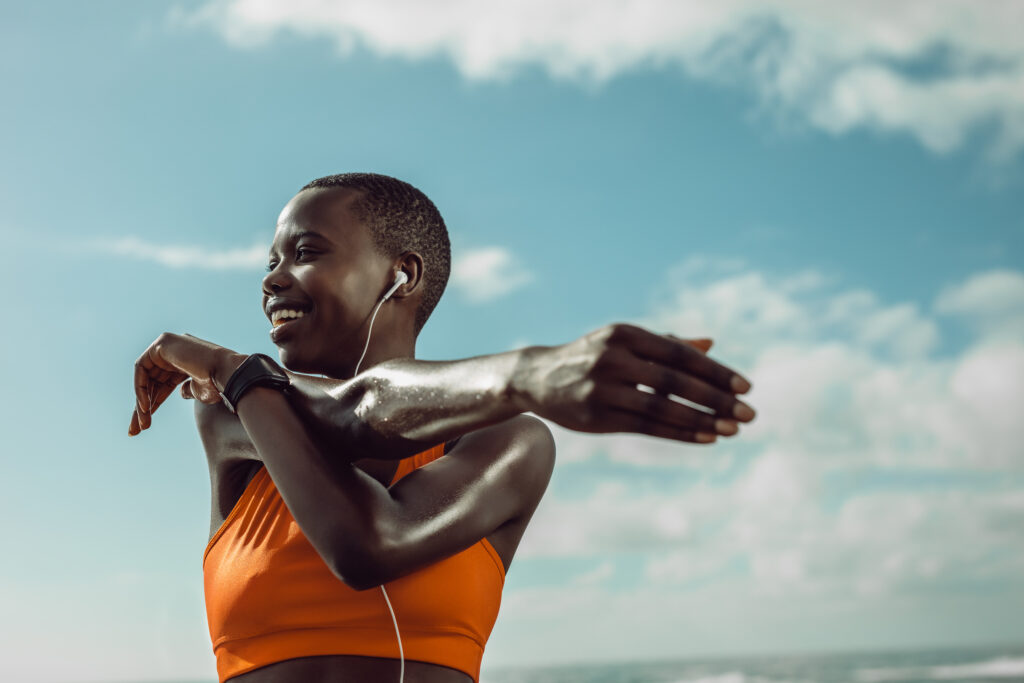Aug 16, 2023
A Runner’s Guide to Loving on the Skin We’re In – Part I
I’ve suffered from acne most of my life, even and especially as an adult, yikes! But as we push our bodies while clocking miles on the pavement, not only do our joints and muscles take a beating so does our skin – from the sun, sweat, smog, sunscreen, and other pore-clogging elements. But protecting our skin doesn’t have to be stressful. Taking on an inside-out approach to loving on our outer selves is a surefire way to ensure we love the skin that we’re in.
As most of us know already, the skin is our body’s largest organ. All of our organs aren’t internal like the brain or the heart. One of the main functions of the skin is protection – protection from external factors such as heat, light, injury, and infection. Our skin is the one organ that comes into contact with the rest of the world, which can be a daunting thought. But just as it keeps contaminants out it also serves to hold the water we ingest in, promoting perpetual hydration.
Throughout our lives, our skin will change constantly, for better or worse. In fact, our skin will regenerate itself approximately every 30 days. Proper skincare is paramount to maintaining the vitality of this protective organ. Healthy skin—and its ability to function properly—starts with nutrition and hydration. In her book, Skin Care for Runners: Tips and Tricks for the Everyday Athlete, dermatologist, and Marathoner Dr. Brooke A. Jackson breaks down how we can level up the well-being of our skin.
- Free radicals are molecules produced by environmental toxins, such as ultraviolet light and pollution. Antioxidants are compounds in foods that scavenge and neutralize these free radicals, intercepting them and shielding us from disease-producing damage. These powerhouse nutrients can be found in fruits, veggies, whole grains, nuts, seeds and dark chocolate.
- Plant-Based Protein. Protein is vital as it provides the building blocks for our body tissues and repairs damaged tissues, particularly after a workout. Excellent sources of plant-based protein include chickpeas, lentils, black beans, walnuts and tofu.
- Essential Fatty Acids (EFAs). Omega-3 and omega-6 are polyunsaturated fats that are the foundation of strong cells. They are integral in the formation of the skin’s oil barrier and keep our skin plump and hydrated. Omega-3 sources include walnuts, flax, avocados, oily fish and eggs. Omega-6 essentials are found in almonds, walnuts, and oils, such as soybean, vegetable, and corn.
- Vitamins & Minerals. Vitamins and minerals are mandatory for healthy skin. But too many of these requisites can be detrimental, so take care to check the daily values of your multivitamins and supplements and add them up. Here’s a look from A to Z:
- Vitamin A is an important nutrient for the skin and eyes.
- Vitamin B3 is an antioxidant and water-soluble vitamin that works to prevent water loss and retain the skin’s moisture content.
- Vitamin C plays a role in the production of collagen and is a basic protein that provides structure, support, and strength to our skin, muscles, bones and connective tissues.
- Vitamin D is not actually a vitamin, it is a fat-soluble hormone that helps to regulate the skin’s immune function, decreases inflammation, and aids in skin cell turnover.
- Vitamin E is an antioxidant that neutralizes damage after UV exposure.
- Zinc is a mineral required for DNA synthesis, wound healing, and immune function, also offers anti-inflammatory and antibacterial benefits. Topically, zinc oxide is a physical sun guard that deflects harmful UV rays.
- Many of us are in a constant state of dehydration, especially when running, exercising, and sweating, and don’t even know it. However, adequate hydration is critical to performance. Water alone doesn’t always deliver and can in turn cause our electrolytes, particularly our sodium levels, to be diluted, leading to hyponatremia, which can be very dangerous. Replace electrolytes with supplements or fortified drinks.
Protecting the skin that protects us from the world’s elements—the good and the not-so-good—starts from the inside, out. In fact, many athletes have found that diets rooted in plant-based, whole foods (foods in their natural state) actually increase endurance and allow for better physical performance. Stay tuned for Part II of A Runner’s Guide to Loving on the Skin We’re In where we focus on taking care of and preserving our skin from the outside.

By: Joy Harrell @joyrunsrealestate
Joy Harrell is a licensed real estate agent and co-owner of The Sift Sisters bakery based in Houston, Texas. She is a native Houstonian and graduate of the University of Houston—go Coogs! When she is not helping people buy, sell or invest in real estate, she can be found hanging or traveling with her hubby, running or biking the streets and trails in and around Houston, mentoring girls, or testing new food and cocktail recipes.

